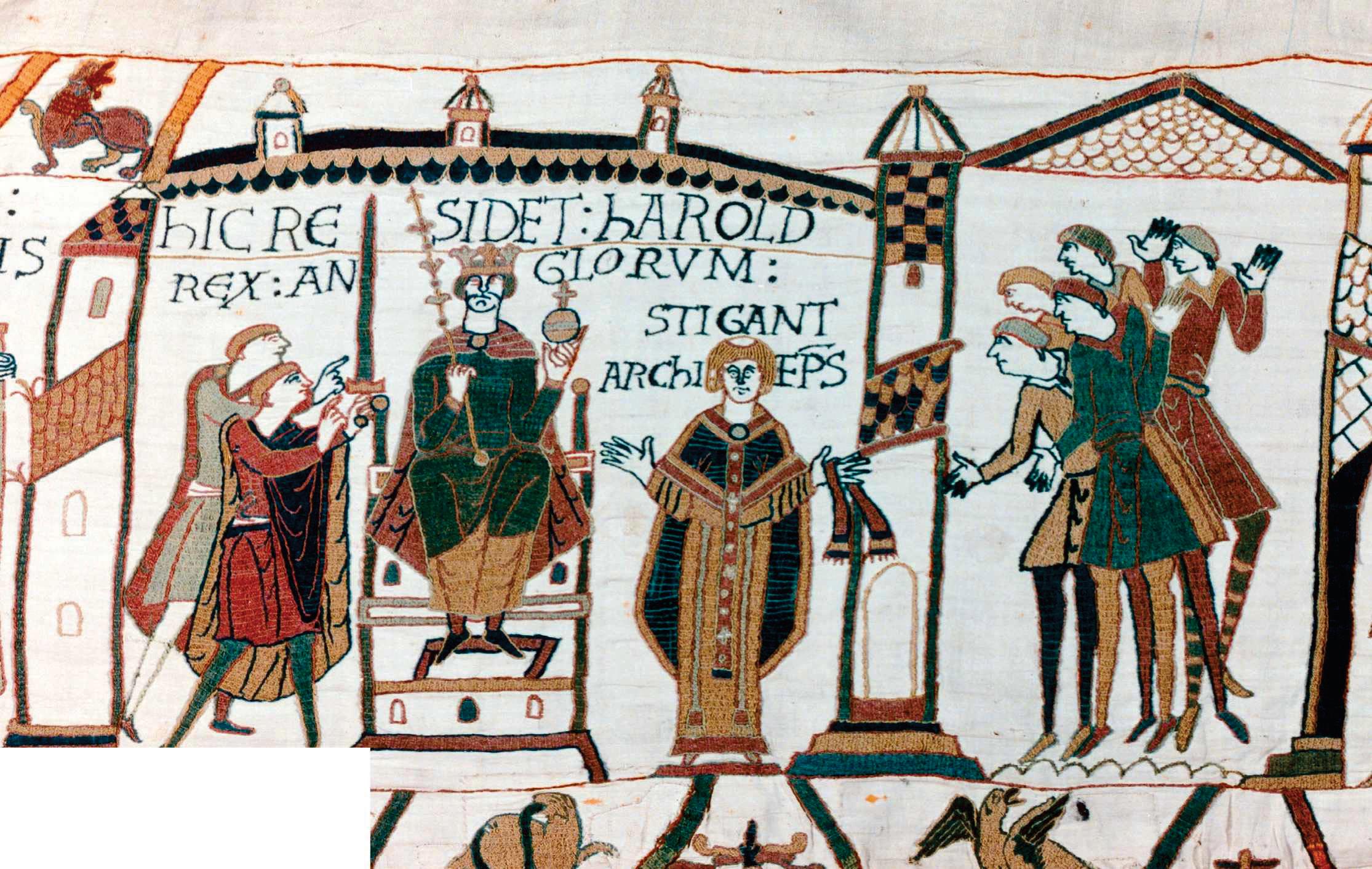يحاول ذهب - حر
WHO WAS THE RIGHTFUL KING?
October 2025
|BBC History UK
Which of four main contenders for the English throne had the strongest claim? Was it the Anglo-Saxon strongman, the Norman duke, the 'Thunderbolt of the North' or a callow teenager? Caitlin Ellis sizes up the rivals

It was a terrible start to an extraordinary year.
1066 was barely five days old when Edward the Confessor, king of the English, succumbed to a short illness and breathed his last. Just a week earlier, crowds had gathered to witness the consecration of Westminster Abbey, Edward's personal passion project - and his final resting place. Now the people of England braced themselves for an uncertain future.
Edward's 23 years on the throne had not been easy. He had restored the English royal line after a period of Danish rule under Cnut the Great and his sons. A political pragmatist, he weathered squabbles among the nobles. He was, chroniclers agreed, a good and righteous Christian. Yet Edward had one huge frailty: he had not produced an heir to succeed him. And that created a power vacuum.
Into that vacuum stepped the dead king's formidable brother-in-law, Earl Harold Godwinson. Initially, Harold had the crucial advantages of physically being in England when Edward died, and of commanding plenty of support across the realm. Among those supporters was an unknown poet who wrote that the Confessor had "entrusted the realm / To a man of high rank, to Harold himself / A noble earl who all the time / Had loyally followed his lord's commands."
In the poet's eyes, at least, Harold was the right man to fill Edward's boots. Of course, in the event it was not so simple - and 1066 proved to be a bloody and momentous year.
The stage was now set for a contest for the English crown between three powerful men and a boy. There was Harold Godwinson; Duke William of Normandy; the Viking king Harald Hardrada; and a young man, probably only a teenager, often omitted from this story: Edgar Ætheling, Edward's great-nephew. We know, of course, which one of these contenders held the crown in his possession at the end of the year. What is less certain is who was the most deserving.
هذه القصة من طبعة October 2025 من BBC History UK.
اشترك في Magzter GOLD للوصول إلى آلاف القصص المتميزة المنسقة، وأكثر من 9000 مجلة وصحيفة.
هل أنت مشترك بالفعل؟ تسجيل الدخول
المزيد من القصص من BBC History UK

BBC History UK
On the skids
Richard Rodgers and Oscar Hammerstein II's smash musical Oklahoma! opened on Broadway on 31 March 1943.
1 min
Christmas 2025

BBC History UK
Small pleasures
Memory is imperfect, but what if you could get a professional model maker to recreate a moment from the past?
1 min
Christmas 2025

BBC History UK
Bath in five places
In the Georgian era, Bath became arguably Britain's most fashionable destination. KIRSTEN ELLIOTT promenades five historic highlights
3 mins
Christmas 2025

BBC History UK
End times
Why do civilisations that dominated their epoch fail? In an era of autocracy, climate change, the rise of Al and a first-hand understanding of how deadly pandemics can be, it's a question that seems pertinent.
1 min
Christmas 2025

BBC History UK
What are the origins of the Yule Lads?
To learn about the Jólasveinar (Yule Lads), we must start with their mother, the terrifying ogress Grýla. Her name appeared in Icelandic texts as early as the 13th century, although it wasn’t until later that those 13 mischievous lads became associated with her. Folk tales and poems tell how she descends from the mountains with an empty sack to stuff full of children. Grýla owns the monstrous Jólaköttur (Yule Cat), which roams the countryside on Christmas Eve, searching for children to gobble up if they're not wearing new clothes.
1 mins
Christmas 2025

BBC History UK
Santa Claus v Father Christmas
The true identity of the white-bearded, red-robed figure who fills children's stockings at Christmas has long been debated. Thomas Ruys Smith sizes up the merry contenders
8 mins
Christmas 2025

BBC History UK
Frontier friction
Set in Washington Territory in 1854, The Abandons is a Western that's unusual for having two matriarchs, women whose lives become entangled, at its centre.
1 min
Christmas 2025

BBC History UK
The Last Days of Pompeii: The Immersive Experience
Delve into the culture of daily Roman life, witness the momentous eruption of Mount Vesuvius, and follow its fallout in Immerse LDN's new exhibition. In a blend of cutting-edge technology and vivid storytelling, this exhibition launches visitors into Pompeii's rich history with recreations of the ancient city's beautiful pre-eruption landscape, a 360-degree virtual reality Roman amphitheatre experience, and a digital metaverse recreating Pompeii's 'Villa of Mysteries'.
1 min
Christmas 2025

BBC History UK
Elizabeth Marsh The corsair's captive
Taken hostage by a Barbary ship's captain in the 18th century, a young Englishwoman found herself fighting for her freedom in Marrakech. ADAM NICHOLS introduces a brave captive who later wrote a book about her dramatic experiences
6 mins
Christmas 2025

BBC History UK
29 DECEMBER 1170: Thomas Becket is murdered in Canterbury
Knights loyal to Henry II rid him of the “low-born cleric”
2 mins
Christmas 2025
Listen
Translate
Change font size
